Unit 2 Keeping Healthy Topic 2 Section D- 精品课件(仁爱版)+嵌入音频(共34张PPT)
文档属性
| 名称 | Unit 2 Keeping Healthy Topic 2 Section D- 精品课件(仁爱版)+嵌入音频(共34张PPT) |
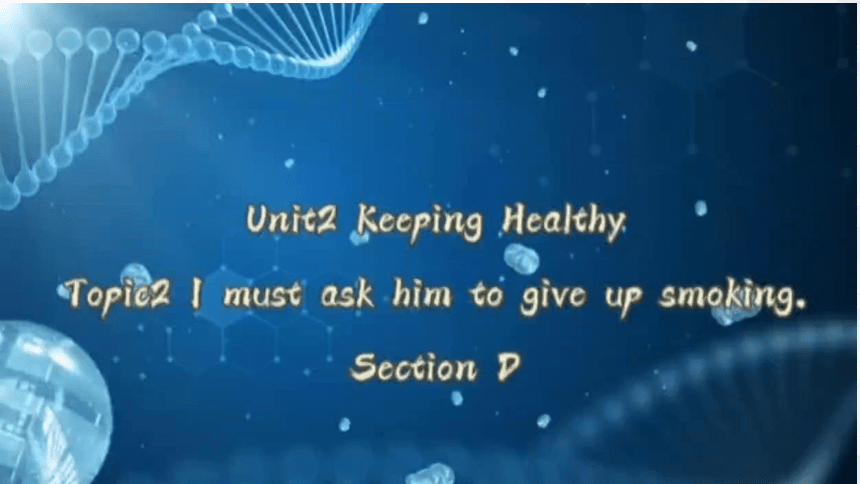
|
|
| 格式 | pptx | ||
| 文件大小 | 32.5MB | ||
| 资源类型 | 教案 | ||
| 版本资源 | 仁爱科普版 | ||
| 科目 | 英语 | ||
| 更新时间 | 2023-09-27 11:55:20 | ||
图片预览

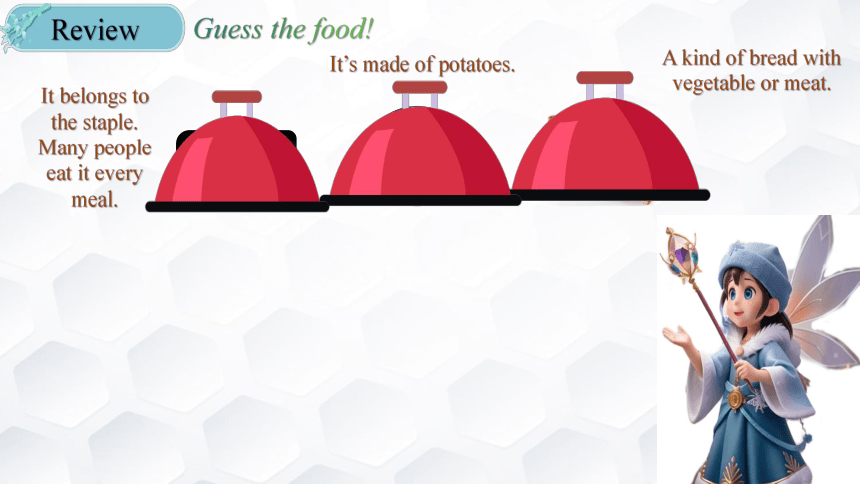
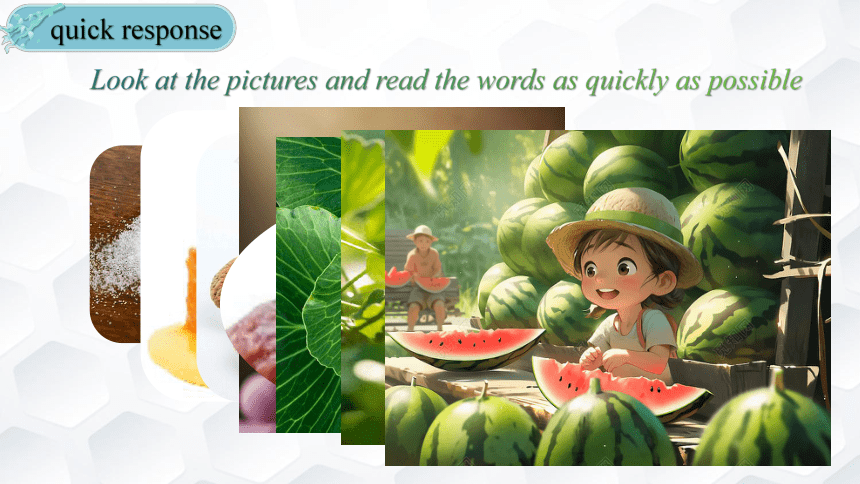
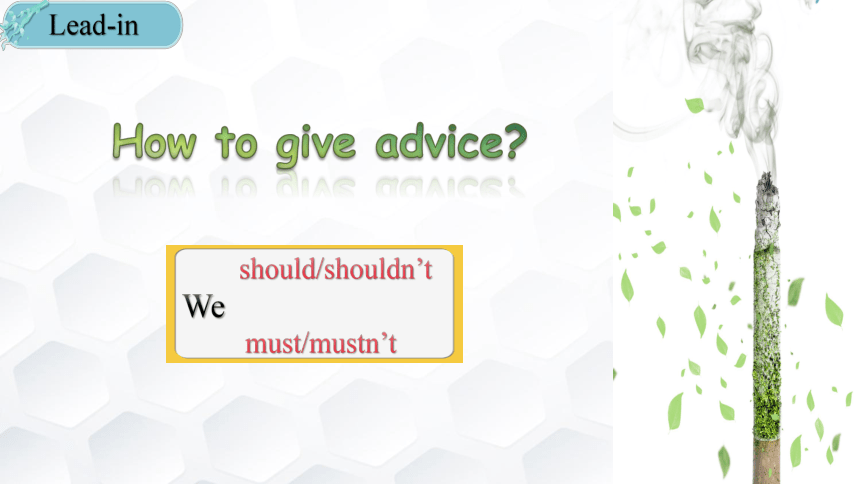
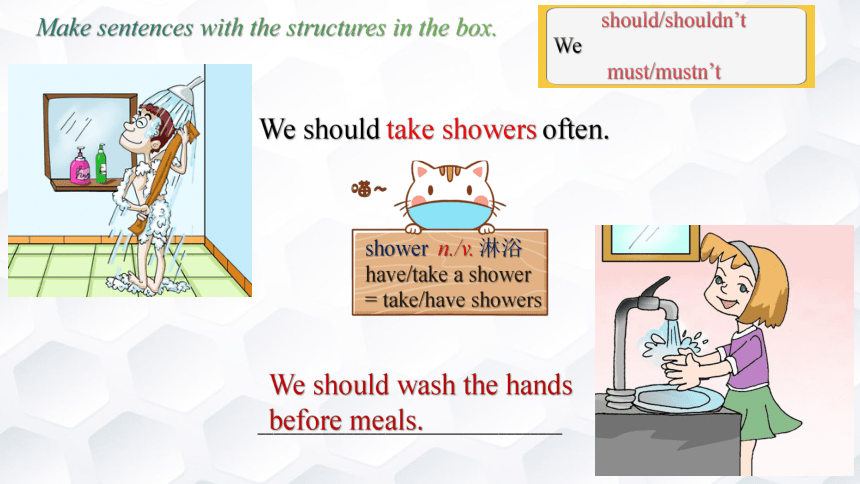
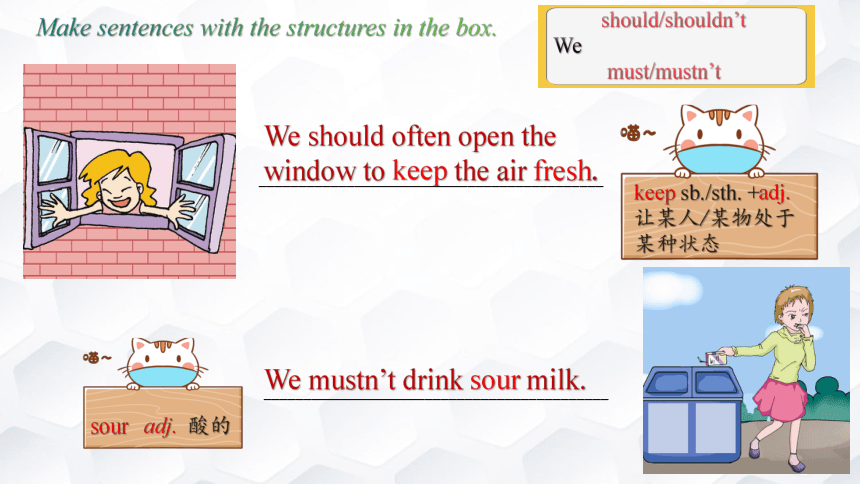
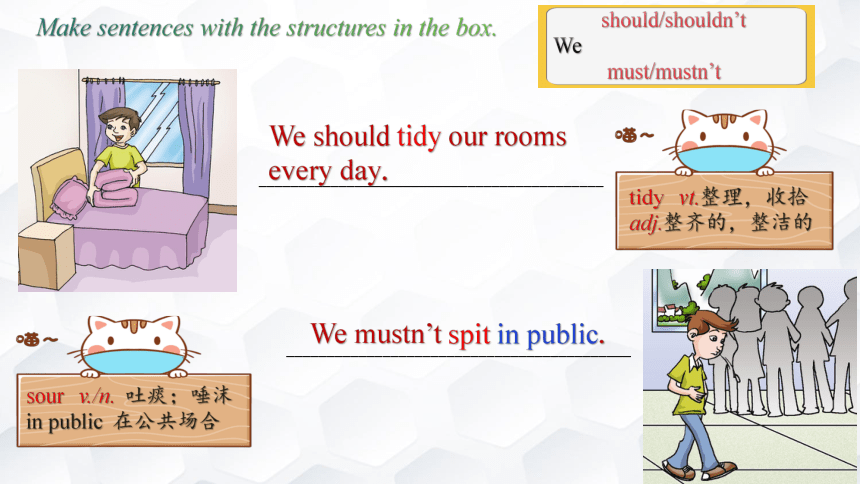
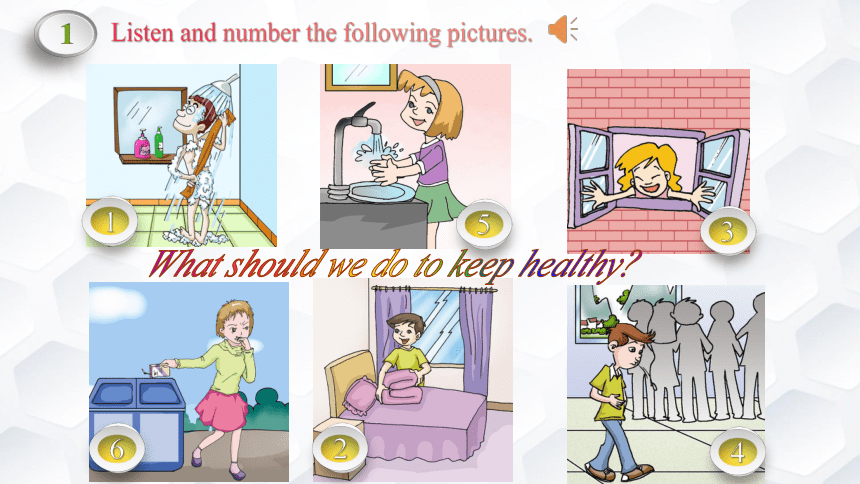
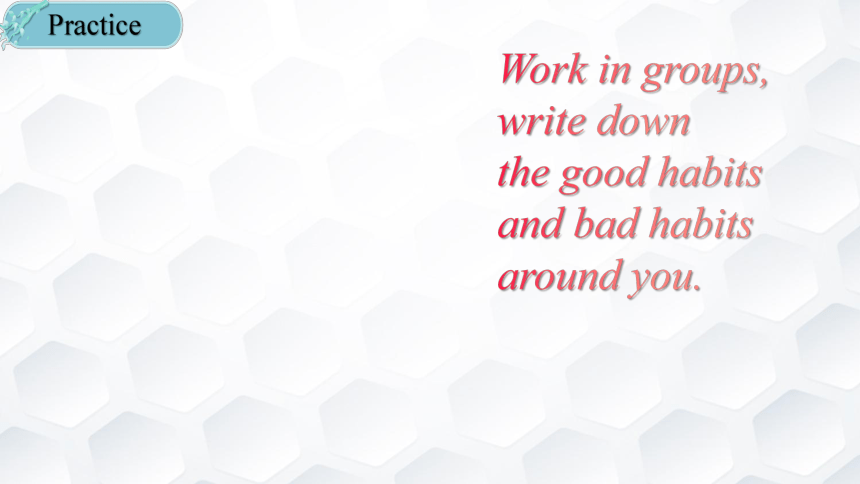
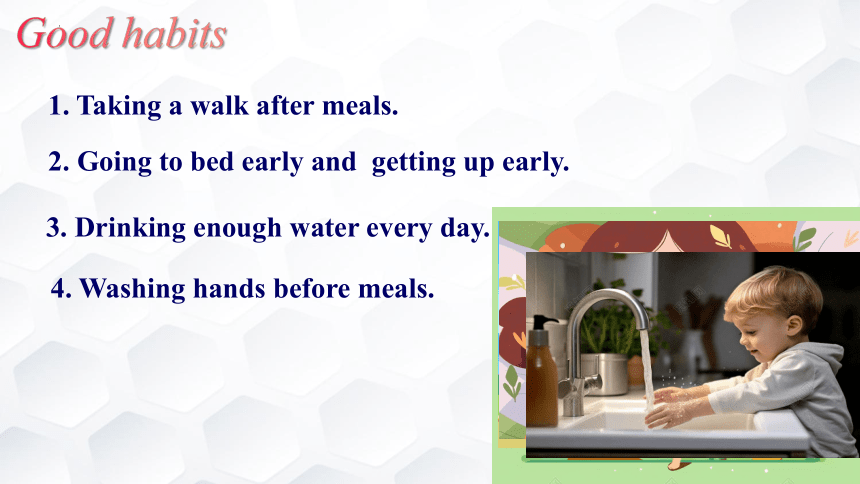
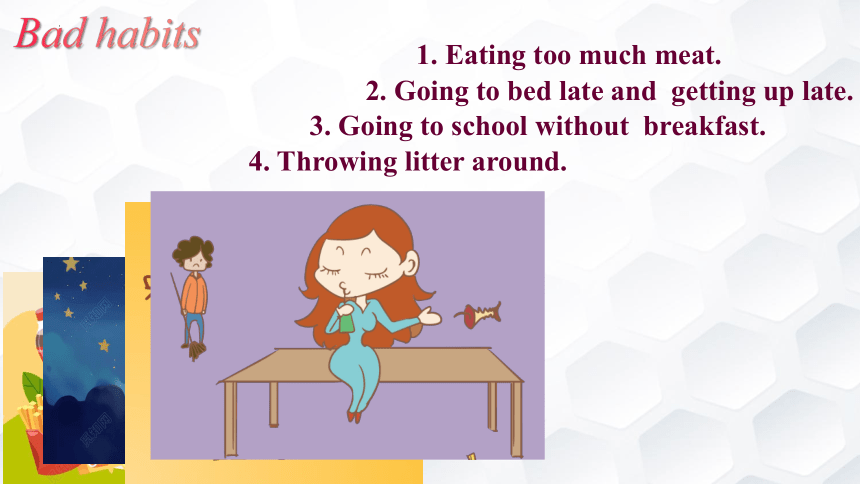
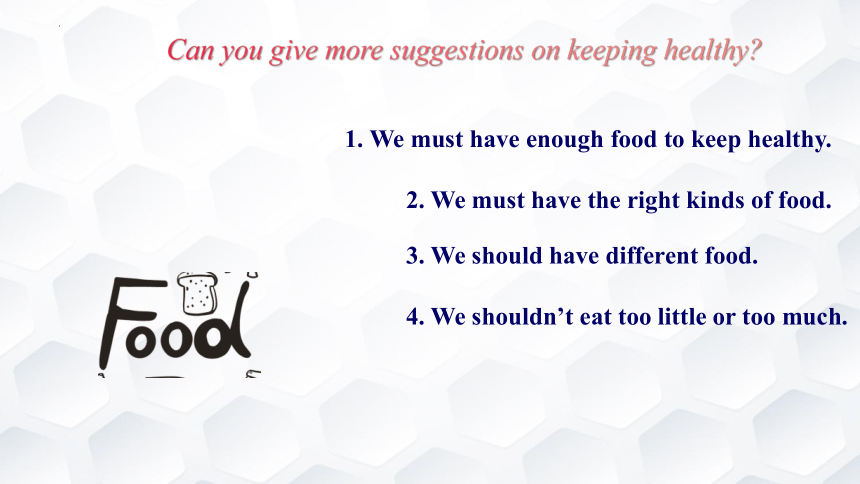
文档简介
(共34张PPT)
It’s made of potatoes.
It belongs to the staple. Many people eat it every meal.
A kind of bread with vegetable or meat.
Review
Guess the food!
Look at the pictures and read the words as quickly as possible
quick response
How to give advice
should/shouldn’t
We
must/mustn’t
Lead-in
Make sentences with the structures in the box.
should/shouldn’t
We
must/mustn’t
We should take showers often.
______________________________________
We should wash the hands
before meals.
shower n./v. 淋浴
have/take a shower
= take/have showers
Make sentences with the structures in the box.
should/shouldn’t
We
must/mustn’t
___________________________________________
We should often open the window to keep the air fresh.
___________________________________________
We mustn’t drink sour milk.
keep sb./sth. +adj.
让某人/某物处于某种状态
sour adj. 酸的
Make sentences with the structures in the box.
should/shouldn’t
We
must/mustn’t
___________________________________________
We should tidy our rooms every day.
___________________________________________
We mustn’t spit in public.
tidy vt.整理,收拾adj.整齐的,整洁的
sour v./n. 吐痰;唾沫
in public 在公共场合
Listen and number the following pictures.
1
1
5
3
4
2
6
What should we do to keep healthy
Work in groups, write down
the good habits
and bad habits around you.
Practice
Good habits
4. Washing hands before meals.
1. Taking a walk after meals.
2. Going to bed early and getting up early.
3. Drinking enough water every day.
Bad habits
3. Going to school without breakfast.
1. Eating too much meat.
2. Going to bed late and getting up late.
4. Throwing litter around.
Can you give more suggestions on keeping healthy
1. We must have enough food to keep healthy.
2. We must have the right kinds of food.
3. We should have different food.
4. We shouldn’t eat too little or too much.
Complete the passage with the correct words.
Some people think that smoking ________ ( must/can) help him relax. In fact, smoking is really __________ (healthy/unhealthy). Do you know that there ______ (is/are) over 4000 chemicals in cigarettes These chemicals are _______ (good/bad) for our bodies. They _____ (must/can) cause cancer and other diseases.
The smoke from cigarettes harms ____________ (only/ not only) smokers but also other people. It’s called “second-hand smoke” and it ______ (can/can’t) be more dangerous and has higher risks. Smokers shouldn’t use smoking to help them relax. They ______ (must/mustn’t) give up smoking as soon as possible.
can
unhealthy
are
bad
can
not only
can
must
2
考点:
(1)in fact “事实上,实际上”
= as a matter of fact
(2)unhealthy “不健康的”
be unhealthy = be not healthy 是不健康的
1. In fact, smoking is really unhealthy.
Language points
2. The smoke from cigarettes harms not only smokers but others.
考点:
harm 既可以作动词,也可以作名词,其形容词为harmful。
“伤害”的表达:
harm sb./sth. (v.)
= do harm to sb./sth. (n.)
= be harmful to sb./sth. (adj.)
考点:
句中的not only A but B “不但A而且B”省略了also,(= not only A but also B = not only A also B),A、B是两个并列成分,在词性和在句子中的功能方面都是相同的。
但A、B作主语时,由B来决定谓语的形式(即遵循就近原则)。
eg. Not only you but also your brother needs to keep away from smoking and drinking.
不仅你而且你的弟弟都需要远离抽烟和酗酒。
(连接两个主语)
eg. My sister can not only play the piano well but also play chess well.(连接两个谓语)
2. The smoke from cigarettes harms not only smokers but others.
Language points
及时练习:
1. Not only you but also she ________ (learn) art.
2. Not only Lily but also I ________ (be) good at English.
3. Not only your friends but our friends ________ (like) ice cream.
4. Jack can play the guitar well, He can also play erhu well.
(改为同义句)
Jack can _____ _____ play the guitar will _____ _____ play erhu well.
learns
am
like
not only
but also
考点:
use A to do B = use A for doing B
意为“用A去做B”
eg. Our teachers often use computers _______ (give) us lessons = Our teachers often use computers for ________ (give) us lessons.
3. Smokers shouldn’t use smoking to help them relax.
Language points
4. They must give up smoking as soon as possible.
考点:
as...as possible “尽可能......地”,可以与as....as one can 互换使用。
eg. We should be as friendly to others as possible.
= We should be as friendly to others as ___ ____.
to give
giving
we can
Project
1. Choose the answer to each question according to your lifestyle.
( )1.How often do you walk to school
A. Never. B. Sometimes. C. Always.
( )2.How often do you eat candy
A. Often. B. Seldom. C. Never.
( )3.How long do you usually sleep at night
A. Less than 7 hours. B. More than 10 hours. C. 7-10 hours.
( )4.How often do you exercise
A. Less than three times a week. B. Three to six times a week.
C. Every day.
( )5.How often do you eat fruit and vegetables
A. Never. B. Seldom. C. Often.
( )6.How long do you watch TV every day
A. More than 4 hours. B. 2-4 hours. C. Less than 2 hours.
Project
Testing How Healthy You Are
Scores: A = 1 point B = 2 points C = 3 points
Total score: _________
Conclusion What you should do to keep healthy.
(6-9) Unhealthy
(10-13) Just so-so
(14-18) Healthy
Read through Sections A-C and fill in the blanks with the correct words.
Grammar
You _______ throw litter around. He thinks smoking ____ help him relax.
It ____ even cause cancer. You _____ take some medicine.
_____ I borrow your newspaper and show it to my father
Modal Verbs (IⅠ): must/mustn’t; may; can
mustn’t
can
May
can
must
Functions
________ up late is bad for your health.
How terrible! It’s ________ for your health.
Don’t read _____ the sun. It will keep you ______ during the day.
in
good
active
Staying
一、can/could
can
be able to
1. can 表示能力,意为“能,会”。没有人称和数的变化,其过去式为could。
只有一般现在时和一般过去时两种时态。
be able to 表示能力,强调通过努力而获得的能力。可用于多种时态:
一般现在时:am/is/are able to
一般过去时:was/were able to
一般将来时:will be able to
现在完成时:have/has been able to
2. can/could表示请求、允许(could更委婉),意为“可以”。
eg. Can/Could I smoke here
3. can表示推测,常用于否定句和疑问句中,意为“可能”。
eg. —Can that man behind the tree be your teacher
—No, he can’t be our teacher. I saw our teacher in the office just now.
“不可能是”
闯关练习:
1. Mike can play the piano.(改为否定句)
Mike ____ _____ the piano.
2. Lily can sing Japanese songs. (改为一般疑问句)
____ Lily _____ Japanese songs .
3. —Jim,_______you sing English songs —Yes, I _______.
A. could;can B.could;could
C.can;can D.can; could
4. —Could he swim when he was ten years old —______.
A. No, he can't. B.Yes, he can.
C.Yes, he does. D.No, he couldn't.
5. We’ll ______ learn English well soon.
A. can B. could C. is able to D. be able to
can play
Can sing
C
D
D
二、may/might
肯定回答
否定回答
1. may 表示请求、许可,多用于肯定句和疑问句。没有人称和数的变化,
其过去式为might。在表示请求的疑问句中,might 比 may更委婉。
由may引导的一般疑问句(此时可与can 互换),
其肯定回答:Certainly./Of course./Yes, you can.
(may引起的问句一般避免用may做肯定回答,常用can)。
其否定回答:No, you can’t./No, you mustn’t.
eg. —May I park here
—I’m sorry you can’t/mustn’t.
2. may表示推测,常用于肯定句中,暗含不确定,意为“也许,可能”。
eg. It may be sunny later on. 一会可能会天晴。
闯关练习:
---May I have a word with you
---No, you_______ . I'm busy today.
A. needn't
B. can't
C. don’t have to
B
闯关练习:
John ____come to the party tonight,
but he isn't very sure yet.
A. can
B. may
C. has to
B
D. must
解析:
can用于推测的“可能”,
多用于否定和疑问句;
must是最有把握的肯定推测“一定”;
从后文“但他还不能肯定”可知,“他可能会来”,
答案选may(表示“可能”,暗含不确定)。
三、must
must
mustn’t
1. must 表示义务,可用于肯定句和疑问句,意为“必须”。
mustn’t 表示不许或禁止,意为“不准,严禁”。
eg. You must finish your homework before going to bed.
You mustn’t throw litter around.
2. must表示有把握的推测,用于肯定句,意为“一定”。
eg. The light is on, so he must be at home now.
3. 由must引起的一般疑问句,
其肯定回答:Yes, you must.
其否定回答:No, you needn’t./No, you don’t have to. (不能用mustn’t回答)
肯定回答
否定回答
闯关练习:
You _____ cross the road when the traffic lights are red.
A. can't
B. mustn't
C. needn’t
B
D. shouldn’t
1.— Watching TV too much _______ bad for your eyes.
— I’ll go to bed right away.
A. is B. are C. was D. be
2.— If you feel _______, you should go to school.
A. bad B. worse C. better D. good
3.— I can’t keep myself active during the day.
— You _______ take more exercise.
A. must not B. must be C. need to D. may be
4. —You had better ask your brother _______ playing
computer games. It’s bad for him.
A. to give up B. not to give up
C. to give it up D. not give it up
Exercises
A
C
C
A
选择方框中的句子完成对话。
A:Which is more important, wealth or health
B:In my opinion (观点), _____ .
A:I agree with you. But how can we keep healthy
B:I think ____ especially (尤其) green vegetables and fruit.
A:Can we eat too much meat
B:No, I think ____ .
A:What else should we do
B:We should _____ . But remember not to do sports soon
after meals.
A:I see. _____
B:It is good.
C
D
A
E
B
Exercises
A. that is bad for our health
B. Is going to bed early good or bad
for our health
C. health is more important than wealth
D. we should eat healthy food
E. do some sports every day
How to use must/mustn’t,
may, can.
2. Be able to talk about good habits
and bad habits.
Sum up
Homework
1. Read 2.
2. Please write a passage about “What should we do to keep healthy”
3. Finish Section D in your workbook.
4. Preview Section A in next topic.
Thank you!
It’s made of potatoes.
It belongs to the staple. Many people eat it every meal.
A kind of bread with vegetable or meat.
Review
Guess the food!
Look at the pictures and read the words as quickly as possible
quick response
How to give advice
should/shouldn’t
We
must/mustn’t
Lead-in
Make sentences with the structures in the box.
should/shouldn’t
We
must/mustn’t
We should take showers often.
______________________________________
We should wash the hands
before meals.
shower n./v. 淋浴
have/take a shower
= take/have showers
Make sentences with the structures in the box.
should/shouldn’t
We
must/mustn’t
___________________________________________
We should often open the window to keep the air fresh.
___________________________________________
We mustn’t drink sour milk.
keep sb./sth. +adj.
让某人/某物处于某种状态
sour adj. 酸的
Make sentences with the structures in the box.
should/shouldn’t
We
must/mustn’t
___________________________________________
We should tidy our rooms every day.
___________________________________________
We mustn’t spit in public.
tidy vt.整理,收拾adj.整齐的,整洁的
sour v./n. 吐痰;唾沫
in public 在公共场合
Listen and number the following pictures.
1
1
5
3
4
2
6
What should we do to keep healthy
Work in groups, write down
the good habits
and bad habits around you.
Practice
Good habits
4. Washing hands before meals.
1. Taking a walk after meals.
2. Going to bed early and getting up early.
3. Drinking enough water every day.
Bad habits
3. Going to school without breakfast.
1. Eating too much meat.
2. Going to bed late and getting up late.
4. Throwing litter around.
Can you give more suggestions on keeping healthy
1. We must have enough food to keep healthy.
2. We must have the right kinds of food.
3. We should have different food.
4. We shouldn’t eat too little or too much.
Complete the passage with the correct words.
Some people think that smoking ________ ( must/can) help him relax. In fact, smoking is really __________ (healthy/unhealthy). Do you know that there ______ (is/are) over 4000 chemicals in cigarettes These chemicals are _______ (good/bad) for our bodies. They _____ (must/can) cause cancer and other diseases.
The smoke from cigarettes harms ____________ (only/ not only) smokers but also other people. It’s called “second-hand smoke” and it ______ (can/can’t) be more dangerous and has higher risks. Smokers shouldn’t use smoking to help them relax. They ______ (must/mustn’t) give up smoking as soon as possible.
can
unhealthy
are
bad
can
not only
can
must
2
考点:
(1)in fact “事实上,实际上”
= as a matter of fact
(2)unhealthy “不健康的”
be unhealthy = be not healthy 是不健康的
1. In fact, smoking is really unhealthy.
Language points
2. The smoke from cigarettes harms not only smokers but others.
考点:
harm 既可以作动词,也可以作名词,其形容词为harmful。
“伤害”的表达:
harm sb./sth. (v.)
= do harm to sb./sth. (n.)
= be harmful to sb./sth. (adj.)
考点:
句中的not only A but B “不但A而且B”省略了also,(= not only A but also B = not only A also B),A、B是两个并列成分,在词性和在句子中的功能方面都是相同的。
但A、B作主语时,由B来决定谓语的形式(即遵循就近原则)。
eg. Not only you but also your brother needs to keep away from smoking and drinking.
不仅你而且你的弟弟都需要远离抽烟和酗酒。
(连接两个主语)
eg. My sister can not only play the piano well but also play chess well.(连接两个谓语)
2. The smoke from cigarettes harms not only smokers but others.
Language points
及时练习:
1. Not only you but also she ________ (learn) art.
2. Not only Lily but also I ________ (be) good at English.
3. Not only your friends but our friends ________ (like) ice cream.
4. Jack can play the guitar well, He can also play erhu well.
(改为同义句)
Jack can _____ _____ play the guitar will _____ _____ play erhu well.
learns
am
like
not only
but also
考点:
use A to do B = use A for doing B
意为“用A去做B”
eg. Our teachers often use computers _______ (give) us lessons = Our teachers often use computers for ________ (give) us lessons.
3. Smokers shouldn’t use smoking to help them relax.
Language points
4. They must give up smoking as soon as possible.
考点:
as...as possible “尽可能......地”,可以与as....as one can 互换使用。
eg. We should be as friendly to others as possible.
= We should be as friendly to others as ___ ____.
to give
giving
we can
Project
1. Choose the answer to each question according to your lifestyle.
( )1.How often do you walk to school
A. Never. B. Sometimes. C. Always.
( )2.How often do you eat candy
A. Often. B. Seldom. C. Never.
( )3.How long do you usually sleep at night
A. Less than 7 hours. B. More than 10 hours. C. 7-10 hours.
( )4.How often do you exercise
A. Less than three times a week. B. Three to six times a week.
C. Every day.
( )5.How often do you eat fruit and vegetables
A. Never. B. Seldom. C. Often.
( )6.How long do you watch TV every day
A. More than 4 hours. B. 2-4 hours. C. Less than 2 hours.
Project
Testing How Healthy You Are
Scores: A = 1 point B = 2 points C = 3 points
Total score: _________
Conclusion What you should do to keep healthy.
(6-9) Unhealthy
(10-13) Just so-so
(14-18) Healthy
Read through Sections A-C and fill in the blanks with the correct words.
Grammar
You _______ throw litter around. He thinks smoking ____ help him relax.
It ____ even cause cancer. You _____ take some medicine.
_____ I borrow your newspaper and show it to my father
Modal Verbs (IⅠ): must/mustn’t; may; can
mustn’t
can
May
can
must
Functions
________ up late is bad for your health.
How terrible! It’s ________ for your health.
Don’t read _____ the sun. It will keep you ______ during the day.
in
good
active
Staying
一、can/could
can
be able to
1. can 表示能力,意为“能,会”。没有人称和数的变化,其过去式为could。
只有一般现在时和一般过去时两种时态。
be able to 表示能力,强调通过努力而获得的能力。可用于多种时态:
一般现在时:am/is/are able to
一般过去时:was/were able to
一般将来时:will be able to
现在完成时:have/has been able to
2. can/could表示请求、允许(could更委婉),意为“可以”。
eg. Can/Could I smoke here
3. can表示推测,常用于否定句和疑问句中,意为“可能”。
eg. —Can that man behind the tree be your teacher
—No, he can’t be our teacher. I saw our teacher in the office just now.
“不可能是”
闯关练习:
1. Mike can play the piano.(改为否定句)
Mike ____ _____ the piano.
2. Lily can sing Japanese songs. (改为一般疑问句)
____ Lily _____ Japanese songs .
3. —Jim,_______you sing English songs —Yes, I _______.
A. could;can B.could;could
C.can;can D.can; could
4. —Could he swim when he was ten years old —______.
A. No, he can't. B.Yes, he can.
C.Yes, he does. D.No, he couldn't.
5. We’ll ______ learn English well soon.
A. can B. could C. is able to D. be able to
can play
Can sing
C
D
D
二、may/might
肯定回答
否定回答
1. may 表示请求、许可,多用于肯定句和疑问句。没有人称和数的变化,
其过去式为might。在表示请求的疑问句中,might 比 may更委婉。
由may引导的一般疑问句(此时可与can 互换),
其肯定回答:Certainly./Of course./Yes, you can.
(may引起的问句一般避免用may做肯定回答,常用can)。
其否定回答:No, you can’t./No, you mustn’t.
eg. —May I park here
—I’m sorry you can’t/mustn’t.
2. may表示推测,常用于肯定句中,暗含不确定,意为“也许,可能”。
eg. It may be sunny later on. 一会可能会天晴。
闯关练习:
---May I have a word with you
---No, you_______ . I'm busy today.
A. needn't
B. can't
C. don’t have to
B
闯关练习:
John ____come to the party tonight,
but he isn't very sure yet.
A. can
B. may
C. has to
B
D. must
解析:
can用于推测的“可能”,
多用于否定和疑问句;
must是最有把握的肯定推测“一定”;
从后文“但他还不能肯定”可知,“他可能会来”,
答案选may(表示“可能”,暗含不确定)。
三、must
must
mustn’t
1. must 表示义务,可用于肯定句和疑问句,意为“必须”。
mustn’t 表示不许或禁止,意为“不准,严禁”。
eg. You must finish your homework before going to bed.
You mustn’t throw litter around.
2. must表示有把握的推测,用于肯定句,意为“一定”。
eg. The light is on, so he must be at home now.
3. 由must引起的一般疑问句,
其肯定回答:Yes, you must.
其否定回答:No, you needn’t./No, you don’t have to. (不能用mustn’t回答)
肯定回答
否定回答
闯关练习:
You _____ cross the road when the traffic lights are red.
A. can't
B. mustn't
C. needn’t
B
D. shouldn’t
1.— Watching TV too much _______ bad for your eyes.
— I’ll go to bed right away.
A. is B. are C. was D. be
2.— If you feel _______, you should go to school.
A. bad B. worse C. better D. good
3.— I can’t keep myself active during the day.
— You _______ take more exercise.
A. must not B. must be C. need to D. may be
4. —You had better ask your brother _______ playing
computer games. It’s bad for him.
A. to give up B. not to give up
C. to give it up D. not give it up
Exercises
A
C
C
A
选择方框中的句子完成对话。
A:Which is more important, wealth or health
B:In my opinion (观点), _____ .
A:I agree with you. But how can we keep healthy
B:I think ____ especially (尤其) green vegetables and fruit.
A:Can we eat too much meat
B:No, I think ____ .
A:What else should we do
B:We should _____ . But remember not to do sports soon
after meals.
A:I see. _____
B:It is good.
C
D
A
E
B
Exercises
A. that is bad for our health
B. Is going to bed early good or bad
for our health
C. health is more important than wealth
D. we should eat healthy food
E. do some sports every day
How to use must/mustn’t,
may, can.
2. Be able to talk about good habits
and bad habits.
Sum up
Homework
1. Read 2.
2. Please write a passage about “What should we do to keep healthy”
3. Finish Section D in your workbook.
4. Preview Section A in next topic.
Thank you!
同课章节目录
- Unit 1 Playing Sports
- Topic 1 I'm going to play basketball.
- Topic 2 I'll kick you the ball again.
- Topic 3 The school sports meet is coming.
- Unit 2 Keeping Healthy
- Topic 1 You should brush your teeth twice a day.
- Topic 2 I must ask him to give up smoking.
- Topic 3 Must we exercise to prevent the flu?
- Unit 3 Our Hobbies
- Topic 1 What's your hobby?
- Topic 2 What sweet music!
- Topic 3 What were you doing at this time yesterday
- Unit 4 Our World
- Topic 1 What's the strongest animal on the farm?
- Topic 2 How can we protect ourselves from the eart
- Topic 3 The Internet makes the world smaller.
